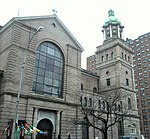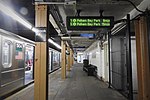Harlem River Yards

Harlem River Yards (also known as Harlem River Yard) is a waterfront industrial property located in the Mott Haven and Port Morris neighborhoods of the Bronx in New York City. It is operated by Harlem River Yard Ventures, part of the Galesi Group, under a 99-year lease with the State of New York signed in 1991.The yard owes its name to the property's prior and current use as a freight rail yard. However, only a 28-acre portion of the site has been retained for intermodal rail use, with rail traffic to and from the yard limited to municipal solid waste shipment. Beginning in the late 1990s, Harlem River Yards has been the site of substantial commercial development, including a New York Post printing plant, a waste treatment plant, and a FedEx distribution center.
Excerpt from the Wikipedia article Harlem River Yards (License: CC BY-SA 3.0, Authors, Images).Harlem River Yards
Lincoln Avenue, New York The Bronx
Geographical coordinates (GPS) Address Nearby Places Show on map
Geographical coordinates (GPS)
| Latitude | Longitude |
|---|---|
| N 40.803333333333 ° | E -73.925 ° |
Address
Lincoln Avenue
Lincoln Avenue
10454 New York, The Bronx
New York, United States
Open on Google Maps






